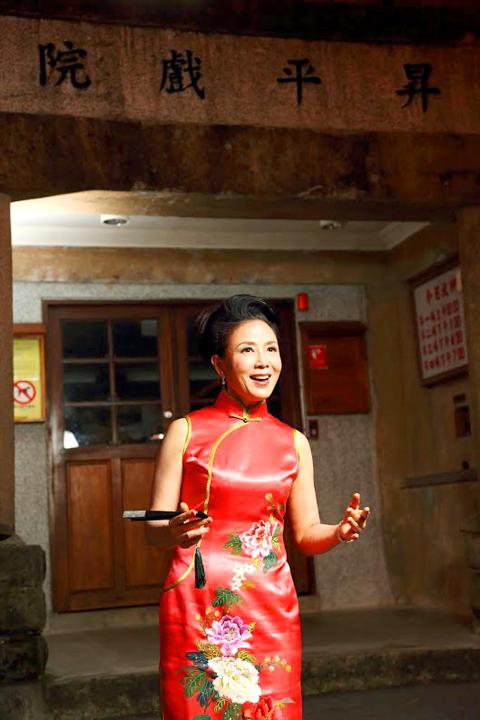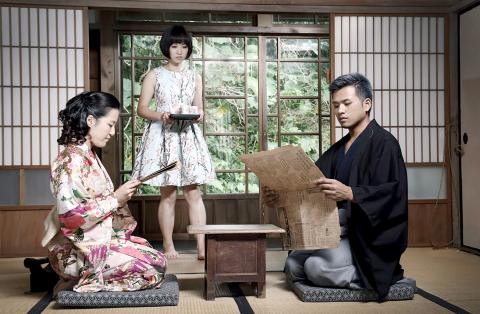Liu Ruo-yu (劉若瑀) has been best known in recent years for her work with the Zen-based drumming troupe U-Theatre (優人神鼓) that she founded in 1988 and the rather ascetic lifestyle it entails.
The company is renowned for its drumming, martial arts training system and its very long yunjiao (雲腳, “cloud feet”) walks — around Taiwan and in several other nations. It just held a three-day walk for young drummers early last month in Taitung County.
So pictures of Liu dressed in a bright red, flower-bedecked cheongsam, hair in a bun, might come as a shock to those who are used to seeing her in more simple cotton and linen outfits.

Photo Courtesy of U-Theatre
However, those who remember Liu from her days as one of Taiwan’s most prominent stage actresses with the Lan Ling Theatre — she won a Golden Bell in the early 1980s — are less surprised by the glamour shots for the company’s new show, Town of Gold (淘金去), which opens in New Taipei City’s Jiufen District (九份) on Friday next week.
Liu quit the stage to go to the US to study for a masters’ degree in theater arts at New York University. After graduation, she was selected to join a one-year-workshop in California led by famed avant-garde Polish director Jerzy Grotowski.
It was Grotowski’s challenge her to explore herself and her heritage that led her found U-Theatre upon her return home, and focus on more traditional Taiwanese folk rituals and music. She wanted to create theater works that would enable both the performers and their audiences to transcend conventional visions.

Photo Courtesy of U-Theatre
The company’s latest production, which is a big departure for U-Theatre, promises to do just that. It is a musical and its 21-member cast includes several actors, actresses and singers, in addition to Liu herself.
Liu and U-Theater were invited to create a show by the New Taipei City Cultural Affairs Bureau, which wanted to give visitors a better understanding of Jiufen’s history.
Company members spent about a year interviewing elderly residents of Jiufen and surrounding area, looking for stories about the town’s history, its culture and the changes it has seen, as well as collecting folk songs and once-popular tunes.
The show focuses on changes to the town during the Japanese era and after World War II and is largely told through the eyes of the women in the story.
While Liu’s skills as an actress focused more on straight theater, she said singing is something she enjoyed as a child, and she grew up listening to her father singing.
Town of Gold will be performed in Jiufen’s Shengping Theater (昇平戲院), which was built in 1914 during the Japanese colonial era. It was Taiwan’s first — and for the time, biggest — modern theater.
The Baroque-style building was renovated in 1961, but closed in 1986 amid the decline of the town’s mining industry.
The theater, like much of Jiufen, was highlighted in Hou Hsiao-hsien’s (侯孝賢) 1989 award-winning film A City of Sadness, which triggered a revival of interest in the town, and the theater became a popular backdrop for several commercials and other productions.
The theater was renovated and reopened as a cinema in September 2011. Now it will serve as the backdrop for a new telling of Jiufen’s story.
Jiufen is a bit off the beaten track for a theater production, but the town can be reached by bus No. 1062 from the Taipei Zhongxiao Fuxing MRT stop, or by a combination train/bus trip to the train station in Rueifang District (瑞芳) and then changing to bus numbers 788, 827 or 825.
Performance Notes
WHAT: Town of Gold
WHEN: Dec. 25 to Dec. 27, Dec. 30, Jan. 1 to Jan. 3, Jan. 6, Jan. 8 to Jan. 10, evenings at 7pm and matinees at 2pm
WHERE: Jiufen Shengping Theater (九份昇平戲院), at the intersection of Hsuchi Road and Chingbian Road, Jiufen, New Taipei City (新北市九份豎崎路與輕便路交接處)
ADMISSION: NT$800 and NT$2,000; available online at www.accupass.com/go/utheatre (phone: 02-8978-1001) or through U-Theatre at 02-2938-8188

April 14 to April 20 In March 1947, Sising Katadrepan urged the government to drop the “high mountain people” (高山族) designation for Indigenous Taiwanese and refer to them as “Taiwan people” (台灣族). He considered the term derogatory, arguing that it made them sound like animals. The Taiwan Provincial Government agreed to stop using the term, stating that Indigenous Taiwanese suffered all sorts of discrimination and oppression under the Japanese and were forced to live in the mountains as outsiders to society. Now, under the new regime, they would be seen as equals, thus they should be henceforth

Last week, the the National Immigration Agency (NIA) told the legislature that more than 10,000 naturalized Taiwanese citizens from the People’s Republic of China (PRC) risked having their citizenship revoked if they failed to provide proof that they had renounced their Chinese household registration within the next three months. Renunciation is required under the Act Governing Relations Between the People of the Taiwan Area and the Mainland Area (臺灣地區與大陸地區人民關係條例), as amended in 2004, though it was only a legal requirement after 2000. Prior to that, it had been only an administrative requirement since the Nationality Act (國籍法) was established in

With over 100 works on display, this is Louise Bourgeois’ first solo show in Taiwan. Visitors are invited to traverse her world of love and hate, vengeance and acceptance, trauma and reconciliation. Dominating the entrance, the nine-foot-tall Crouching Spider (2003) greets visitors. The creature looms behind the glass facade, symbolic protector and gatekeeper to the intimate journey ahead. Bourgeois, best known for her giant spider sculptures, is one of the most influential artist of the twentieth century. Blending vulnerability and defiance through themes of sexuality, trauma and identity, her work reshaped the landscape of contemporary art with fearless honesty. “People are influenced by

The remains of this Japanese-era trail designed to protect the camphor industry make for a scenic day-hike, a fascinating overnight hike or a challenging multi-day adventure Maolin District (茂林) in Kaohsiung is well known for beautiful roadside scenery, waterfalls, the annual butterfly migration and indigenous culture. A lesser known but worthwhile destination here lies along the very top of the valley: the Liugui Security Path (六龜警備道). This relic of the Japanese era once isolated the Maolin valley from the outside world but now serves to draw tourists in. The path originally ran for about 50km, but not all of this trail is still easily walkable. The nicest section for a simple day hike is the heavily trafficked southern section above Maolin and Wanshan (萬山) villages. Remains of